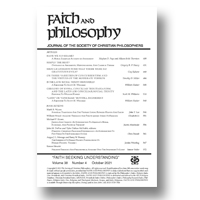|
articles |
|
41.
|
Faith and Philosophy:
Volume >
38 >
Issue: 1
John Pittard
Worship and the Problem of Divine Achievement
abstract |
view |
rights & permissions
| cited by
Gwen Bradford has plausibly argued that one attains achievement only if one does something one finds difficult. It is also plausible that one must attain achievement to be worthy of “agential” praise, praise that is appropriately directed to someone on the basis of things that redound to their credit. These claims pose a challenge to classical theists who direct agential praise to God, since classical theism arguably entails that none of God’s actions are difficult for God. I consider responses to this challenge and commend a view according to which God’s loving character is not necessitated by God’s nature but is a contingent and difficult achievement. I argue that this view can still satisfy the explanatory ambitions of natural theology.
|
|
|
|
|
42.
|
Faith and Philosophy:
Volume >
38 >
Issue: 1
James Dominic Rooney, OP
Banez’s Big Problem:
The Ground of Freedom
abstract |
view |
rights & permissions
| cited by
While many philosophers of religion are familiar with the reconciliation of grace and freedom known as Molinism, fewer by far are familiar with that position initially developed by Molina’s erstwhile rival, Domingo Banez (i.e., Banezianism). My aim is to clarify a serious problem for the Banezian: how the Banezian can avoid the apparent conflict between a strong notion of freedom and apparently compatibilist conclusions. The most prominent attempt to defend Banezianism against compatibilism was (in)famously endorsed by Reginald Garrigou-Lagrange. Even if it were true that freedom does not require alternative possibilities, Banezians have a grounding problem.
|
|
|
|
|
43.
|
Faith and Philosophy:
Volume >
38 >
Issue: 1
Jordan Wessling
On St. Isaac the Syrian’s Argument Against Divine Retribution
abstract |
view |
rights & permissions
| cited by
Many theists maintain that God punishes humans retributively, whereby God intentionally harms those punished as their sins deserve, without also aiming qua punishment to contribute to the immediate or ultimate flourishing of those punished, or to the flourishing of some third (human) party. By contrast, St. Isaac the Syrian in effect contends that such an understanding of divine retribution is incompatible with a plausible understanding of God’s initial creative purposes of love and is thus untrue. In this paper, I present and substantially build upon Isaac’s contention, and I defend the resulting developed argument as a good argument worthy of further consideration.
|
|
|
|
|
book reviews |
|
44.
|
Faith and Philosophy:
Volume >
38 >
Issue: 1
J. L. Aijian
Andrew P. Chignell, ed.: Evil: A History
view |
rights & permissions
| cited by
|
|
|
|
|
45.
|
Faith and Philosophy:
Volume >
38 >
Issue: 1
Brendan Sweetman
Peter Forrest: Intellectual, Humanist and Religious Commitment: Acts Of Assent
view |
rights & permissions
| cited by
|
|
|
|
|
46.
|
Faith and Philosophy:
Volume >
38 >
Issue: 1
Daniel Rubio
Jeffrey Koperski: Divine Action, Determinism, and The Laws of Nature
view |
rights & permissions
| cited by
|
|
|
|
|
47.
|
Faith and Philosophy:
Volume >
38 >
Issue: 1
Jonathan C. Rutledge
Jaco Gericke: A Philosophical Theology of The Old Testament: A Historical, Experimental, Comparative and Analytic Perspective
view |
rights & permissions
| cited by
|
|
|
|
|
48.
|
Faith and Philosophy:
Volume >
38 >
Issue: 1
Douglas Groothuis
N. T. Wright: History and Eschatology: Jesus and The Promise of Natural Theology
view |
rights & permissions
| cited by
|
|
|
|
